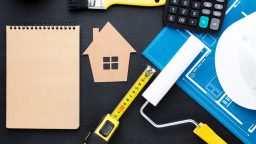Over time, even the most well-built homes can show signs of wear and tear. Whether you’ve been living in the same home for years or recently purchased a property, it’s important to be aware of when your home may be in need of renovation. While some issues are cosmetic, others can be structural or safety-related, requiring immediate attention. Here are some key signs that your home might be due for a renovation.
- Your Home Feels Outdated
One of the most obvious signs that your home needs a renovation is that it feels outdated. If your décor, flooring, and fixtures seem like they belong in the past, it might be time to bring your home up to date. Old-fashioned wallpaper, faded paint colours, or tired carpeting can make a space feel dull and unwelcoming. Renovating your home with modern finishes, new flooring, and updated colour schemes can make a huge difference in both functionality and aesthetic appeal.
The kitchen and bathroom are particularly prone to looking outdated, with older appliances, fixtures, and cabinetry. If your kitchen feels cramped or your bathroom has fixtures that are no longer functioning properly, a renovation could vastly improve both the look and functionality of these spaces.
- You’re Out of Space
Over time, families grow, and lifestyles change, which can often lead to a feeling of overcrowding. If you find that you’re running out of storage or your current layout no longer meets your needs, a renovation may be in order. Whether it’s expanding your kitchen to add more counter space or creating an open-plan layout to improve flow, expanding or reconfiguring your space can make your home feel more comfortable.
Additionally, if you’re constantly adding more furniture or accessories to the same space, a lack of storage might be causing your home to feel cluttered. Renovating with built-in shelves, cabinets, or even a basement or attic conversion could solve these space issues and give you the room you need.
- Your Utility Bills Are Too High
If you’ve noticed that your utility bills have been steadily increasing, it could be a sign that your home needs some renovation work. Old windows, poor insulation, and outdated heating or cooling systems can cause your energy bills to skyrocket. Drafty windows and doors let heat escape in the winter and let warm air in during the summer, while insulation that’s no longer effective can make it difficult to maintain a comfortable temperature.
Upgrading your windows, adding insulation, or replacing an inefficient HVAC system can not only reduce your utility bills but also make your home more environmentally friendly. These kinds of renovations can provide long-term savings and improve your home’s overall energy efficiency.
- You’ve Noticed Cracks in the Walls or Foundation
Cracks in the walls, floors, or foundation are signs that your home may be facing structural issues. While minor cracks are common in older homes, larger cracks can indicate more serious problems, such as shifting foundations or water damage. Cracks in the foundation can lead to issues with the home’s stability, which could eventually result in major damage.
If you notice any visible cracks, it’s important to have them inspected by a professional. Depending on the severity of the damage, repairing or reinforcing the foundation may be necessary. This is one area where it’s best not to delay repairs, as ignoring these issues can lead to more extensive and costly renovations down the line.
- The Roof Needs Repair
The roof is one of the most essential parts of your home’s structure, so it’s crucial to keep an eye on its condition. If your roof is more than 20 years old, has missing or cracked shingles, or leaks during rainy weather, it’s likely time for a renovation or full replacement.
A damaged roof can lead to water infiltration, which can cause serious damage to your home’s interior, including mold growth, rotting wood, and electrical issues. Replacing your roof with a more durable material can protect your home from the elements and increase its value.
- Plumbing and Electrical Issues
Plumbing and electrical problems are common signs that your home needs an upgrade. If you’re experiencing frequent issues with low water pressure, leaky pipes, or clogged drains, it’s important to address these problems before they get worse. Old pipes can also corrode over time, leading to water damage or even bursts.
Similarly, if your electrical system is outdated, you may experience frequent power outages, tripped circuits, or flickering lights. Old wiring can be a fire hazard, so it’s essential to have a licensed electrician inspect and upgrade your system if necessary.
- Poor Lighting and Ventilation
Good lighting and ventilation are key to a comfortable home, but many older homes suffer from poor lighting and ventilation, making rooms feel dark and stuffy. If your home feels gloomy despite having windows or if rooms are too hot or humid, it might be time to renovate.
Consider installing larger windows or adding skylights to improve natural light. Adding ceiling fans, upgrading your HVAC system, or even installing ventilation systems in bathrooms and kitchens can improve air circulation and overall comfort. Renovations like these not only make your home more comfortable but also increase its overall livability.
- Your Home’s Layout Doesn’t Work for You Anymore
The layout of your home plays a huge role in how functional and comfortable the space is. If the design doesn’t fit your current lifestyle—whether it’s too compartmentalized, outdated, or difficult to navigate—it could be time for a layout overhaul.
For instance, you may want to remove walls to create a more open-plan living space or create a larger kitchen by knocking down a dividing wall. A layout change could improve your flow, make entertaining easier, and enhance the functionality of the space. If your home feels cramped or inefficient, this kind of renovation can make a huge difference.
- Pest or Water Damage
Signs of pests or water damage in your home should never be ignored. Unwanted critters, such as termites or rodents, can cause serious damage to your home’s structure and insulation, while water damage from leaks or flooding can result in mold growth and weakened foundations.
If you notice any signs of pests—such as droppings, nests, or chewed-up wood—get a professional pest control service to take care of the problem. For water damage, look for dark stains, peeling paint, or musty smells. Both pest infestations and water damage require prompt attention, as ignoring them can lead to further deterioration and costly repairs.
- You Want to Increase Your Home’s Value
If you’re planning to sell your home in the near future, renovations can significantly increase its market value. Focus on areas that offer the best return on investment (ROI), such as updating the kitchen or bathroom, adding more living space (e.g., converting a basement or attic), or improving curb appeal with landscaping or a fresh coat of paint.
Renovations that enhance the functionality, aesthetics, and energy efficiency of your home can attract more buyers and help you achieve a higher sale price. Just be sure to choose renovations that align with the local housing market and appeal to a wide range of potential buyers.
Conclusion
Renovating your home can breathe new life into a space, but it’s important to know when your home truly needs an update. Whether it’s outdated fixtures, structural issues, or a need for more space, understanding the signs that your home needs renovation is the first step toward making improvements. By addressing these issues before they become bigger problems, you can enhance both the comfort and value of your home, creating a space that meets your needs and reflects your personal style.





